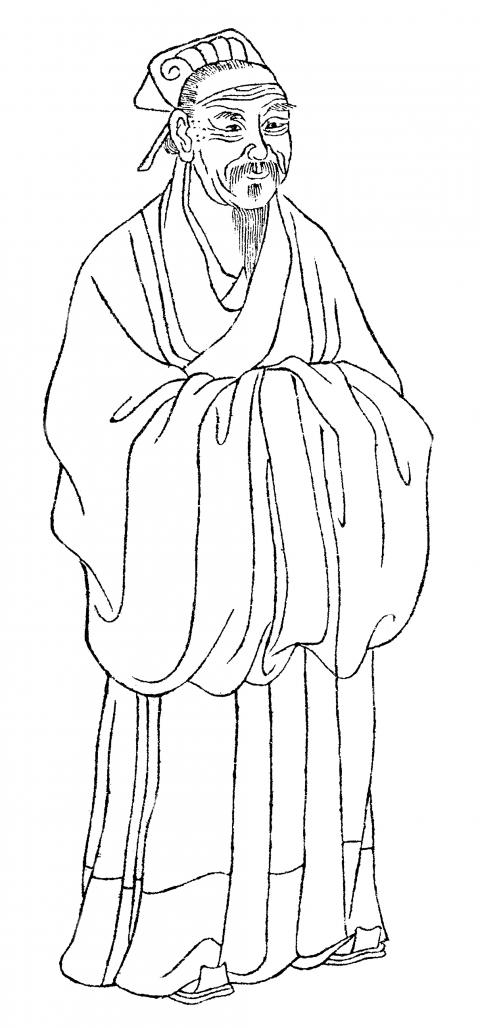Chinese Practice
以其人之道,還治其人之身
(yi3 qi2 ren2 zhi1 dao4 huan2 zhi4 qi2 ren2 zhi1 shen1)

Photo: Wikimedia Commons
照片:維基共享資源
to give somebody a taste of their own medicine
《伊索寓言》,或稱《Aesopica》,是一本寓言故事集,相傳由古希臘時代一位名為伊索(西元前六二?~前五六四年)的奴隸所創作。在書中收錄的眾多寓言中,〈鞋匠改作醫生〉這篇故事描述一位失敗的鞋匠,改而從事販賣假藥,號稱此藥可解各種毒。人們相信他賣的假藥是萬靈丹,於是鞋匠的假藥生意便蒸蒸日上,直到某天,鞋匠自己得了重病。
城裡的地方官早就已經懷疑他的說法,就請下屬拿來一個杯子,假裝把萬靈丹跟毒藥一起用水混合,倒入杯中,命令生病的鞋匠喝下。怕死的鞋匠婉拒了地方官的要求,也不得不招認他的萬靈丹其實根本全無療效。地方官隨後召開了市民大會,質問城裡的居民:「如果你們連他做鞋的品質都不敢信任,你們怎麼能夠把自己的性命託付到他的身上呢?」
這個寓言故事也許就是英文諺語「give somebody a taste of their own medicine」(給某人嚐嚐看他自己開的藥)的由來,意指用某人對待他人的方式對待某人,經常帶有復仇或是報復的意味。
這個諺語的意思相當於中文的「以其人之道,還治其人之身」,現今用來表示以別人的方法來懲治別人,通常含有報復之意;亦即表示,對方採取怎樣的手段,我們就以怎樣的手段予以回擊。
然而,它的原意並非是如此咬牙切齒的。孔子在《中庸》第十三章中說「道不遠人」,並引用了《詩·豳風·伐柯》:
伐柯伐柯,其則不遠。(砍木材做斧柄,斧柄的樣本就在我手上)
孔子此例在說明,砍取做斧頭的木材到底要多長,樣本就是自己手中的斧頭,並不遙遠,「故君子以人治人,改而止。」(所以說君子治理人是拿人能知能行的法則教導人,直到他改正為止。)
南宋理學家朱熹(西元一一三?~一二??年)在《中庸集注》第十三章,解釋孔子所說的「以人治人」,說這句話意為「以其人之道,還治其人之身」——君子以人能夠了解和實行的法則來教導人。此即為成語「以其人之道,還治其人之身」的出處。
朱熹對後世的影響甚大,他所指定的「四書」、「五經」變成典範,應考科舉所皆必須熟讀,因而朱熹的注釋文人皆熟知。
到了後世,隨著通俗小說將古典經句有意無意的誤用,因而此句的原意被曲解了,變成現在我們所熟知的負面意義。例如清·陳忱《水滸後傳》第二十二回:「況這班奸黨,不知屈害多少忠良,以其人之道,還治其人之身,極是快心之事。」
(台北時報章厚明、林俐凱譯)
鄰居半夜兩點彈琴擾人清夢,我以其人之道還治其人之身,在清晨四點敲他的門,說他彈得很好。
(My neighbor woke me by playing the piano at two in the morning, just as I was having a wonderful dream. I gave him a taste of his own medicine, though, by knocking on his door at four and telling him I thought he played magnificently.)
英文練習
to give sb a taste of their own medicine
Aesop’s Fables, also known as the Aesopica, is a collection of fables attributed to a slave from ancient Greece named Aesop (620~564 BCE). One of these fables, The Cobbler Turned Doctor, tells the story of a failed cobbler who turns instead to selling a fake drug he claimed to be an antidote to all poisons. People believed him, and the cobbler was very successful. Then, one day, he himself fell ill.
The town’s governor, long suspicious of the cobbler’s claims, called for a cup to be brought, and mixed the antidote with water and pretended to add a dose of poison. He demanded the cobbler drink it. Scared of being poisoned, the cobbler declined, and confessed his drug was useless. The governor then addressed the people of the town, asking them how they could have trusted a man with their lives when they couldn’t even trust him to make them shoes.
The fable is probably the source of the proverb “give somebody a taste of their own medicine.” Today, this means to treat somebody in the same way that they have treated others, most often in the sense of gaining retribution or revenge.
The Chinese phrase 以其人之道,還治其人之身 is now used to mean punishing others using their own methods, often in the sense, again, of exacting revenge.
The original meaning of the phrase had none of this sense of retribution, however. In Chapter 13 of the Doctrine of the Mean, Confucius says 道不遠人 (“The Way is not far from man”), citing a line from the poem fa ke from the Odes of Bin section of the ancient Chinese classic the Book of Poetry, or shi jing, which goes:
伐柯伐柯,其則不遠。
“In hewing an axe-handle, in hewing an axe-handle, the pattern is not far off.”
Here, Confucius is illustrating the idea that, as one is wielding an axe to make another, it is easy to see how long the axe is meant to be, as the model is, quite literally, at hand. He says 故君子以人治人,改而止 (Therefore, the superior man governs men according to their nature, until they change what is wrong).
In his Collected Annotations on the Doctrine of the Mean, the Song Dynasty Neo-Confucian scholar of the rationalist school Zhu Xi (1130 – 1200) makes a commentary on Confucius’ phrase 以人治人, elucidating on the idea with 以其人之道,還治其人之身 (to govern a person using their own methods).
In this commentary, Zhu Xi is saying that the sage – or “superior man” – instructs people in terms and in ways those people understand. It is this commentary that gives us the modern idiom.
Zhu Xi has had a huge influence on those who came after him: It was he who designated the “Four Books” and the “Five Classics” of the Confucian canon, and anyone wishing to take the civil service examinations would have had to have been well versed in these classics. All scholars, then, would have been very familiar with Zhu Xi’s commentaries.
In subsequent years, however, phrases from the classics would be misused – whether intentionally or not – in novels aimed at a wider readership, and the original meaning of 以其人之道,還治其人之身 came to be distorted.
For example, in chapter 22 of the Qing Dynasty novel The Later Story of Water Margin by Chen Chen, there is the sentence 況這班奸黨,不知屈害多少忠良,以其人之道,還治其人之身,極是快心之事: “Who knows how many good folk fell foul of this band of traitors? How wonderful to see them forced to taste their own medicine.”
(Paul Cooper, Taipei Times)
I’m giving them a taste of their own medicine. Let them suffer the consequences of their actions.
(這一招是以其人之道,還治其人之身,讓他們自食惡果。)

Talks aimed at striking a landmark global treaty on plastic pollution fell apart Friday last week as countries failed to find consensus on how the world should tackle the ever-growing scourge. The talks in Geneva — called after the collapse of the fifth and supposedly final round of talks in South Korea late last year — opened on Aug. 5. Negotiators from 185 nations worked beyond last Thursday’s deadline and through the night in an ultimately futile search for common ground. A large bloc wants bold action such as curbing plastic production, while a smaller clutch of oil-producing states want to

Last year, China’s push for the network certificate and internet ID system sparked widespread debate. The internet ID assigns users a unique code linked to their personal information without revealing their full identity, while the network certificate serves as a digital credential, enabling users to verify their identity across various platforms. This bold policy requires Chinese citizens to connect their online activities to their real identities. An internet “real-name system” demands that every user provide their actual identity information before accessing online services. The goal is to prevent online crime, cyberbullying, and harmful content. China has implemented a comprehensive real-name verification

A: Early this month, Taiwanese pitcher Teng Kai-wei of the San Francisco Giants was called up from Triple-A. B: It’s just awesome. Teng became the 17th Taiwanese to be called up to the majors last year. This marks his second call-up. A: And this time, his jersey number has changed from 70 to 66. B: Who else is likely to be moved up next? A: According to the Major League Baseball (MLB) Web site, Lin Yu-min, Zhuang Chen Zhong-ao, Lee Hao-yu and Cheng Tsung-che are all rising new stars. A: 美職舊金山巨人隊本月初決定,將小聯盟3A投手鄧愷威升上大聯盟! B: 太棒了,他去年曾打進大聯盟,是台灣第17位打進大聯盟球員。 A: 上次他大聯盟背號為70號,這次背號則改為66號。 B: 還有哪些台灣選手有機會挑戰大聯盟? A:

A: In addition to Teng Kai-wei, Taiwanese infielder Cheng Tsung-che was called up temporarily to play for the Pittsburgh Pirates in early April. B: Yeah, Cheng is the 18th player in Taiwan’s baseball history to be moved up to the majors. A: Back in 2002, Chen Chin-feng became the first Taiwanese to play in the Major League Baseball (MLB), followed by Tsao Chin-hui, Wang Chien-ming, Kuo Hung-chih, Hu Chin-lung and Lin Che-hsuan. B: Those pioneers were later joined by Lo Chia-jen, C.C. Lee, Ni Fu-te, Chen Wei-yin, Wang Wei-chung, Hu Chih-wei, Tseng Jen-ho, Lin Tzu-wei, Huang Wei-chieh, Yu Chang,